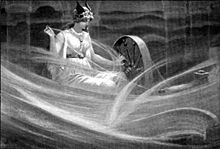Frigg
The Norse goddess Frigg or Frigga (ahd. Frī (j) a , Longobard: Frea ) is the wife of Odin in Norse mythology and belongs to the Aesir . According to some authors, another name for them is saga . She is the patron goddess of marriage, life and motherhood. She is the guardian of the hearth fire and the household.
Protector goddess of life and marriage, queen of heaven and high goddess of the Aesir.
There are many parallels to the goddess Freya , the goddess of love and fertility, with whom she is often equated or confused in modern reception. Frigg, however, plays a more central role through her husband. Her servants are Gefjon, Gna , Fulla , Sygn, Vara, Eira , Hlín , Lofn , and Vjofn.
mythology
In Norse mythology, Frigga fathered the gods Balder , Hödur , Hermodr , Bragi and the Valkyries with Odin . In Asgard , Fensal , the swamp hall, is recorded as their residence. She is said to have woven the clouds. In addition, it was said that Frigg should have driven along on a golden wagon, which is harnessed with two white cats, which probably means lynxes.
Frigg appears for the first time in the 7th century Origo Gentis Langobardorum and around 790 AD in the Historia Langobardorum of Paulus Deacon as Frea. The earliest evidence for the Old High German name Frîja can be found in the 10th century in the second of the Merseburg magic spells , which, however, have their origin in pre-Christian times (before 750 AD).
Frigg as namesake
The weekday Friday (cf. ahd. Frī (j) atac , old English frīgedeag ) is named after Frigg or its South Germanic name Frija . This is a loan translation of the Roman day name Veneris dies , i.e. day of the goddess of love Venus . Therefore, according to the tradition of the Edda , one would rather expect the Germanic goddess of love Freya at this point, which is why she is often named as the namesake of Friday. In Old Norse there were both the terms Freyjudagr and Frjádagr as names for Friday, once referring to Freya and the other time to Frigg. Perhaps Frija's role in the Southern Germans was more similar to Venus and closer to her original role in Germanic mythology than that in Icelandic medieval literature . This is also indicated by the name, which probably means “woman” as in Old Saxon frī and Old English frēo and can be associated with Old Indian priyā́ “love, beloved”.
According to a widespread hypothesis , Frigg, for which the epithet Hulla ("gracious") is attested, developed into the fairytale figure of Frau Holle .
The asteroid Frigga is named after the goddess Frigg. The Orion constellation in Sweden has also been named after her.
literature
- "Loki" story mover, Yvonne s. Bonnetain, Red Dragon Edition, Haufeld 2012
- Jacob Grimm: German Mythology . Marix Verlag, Wiesbaden 2007, ISBN 978-3-86539-143-8 .
- Dr. Vollmer's dictionary of the mythology of all peoples, Wilhelm Vollmer, Reprintverlag im Zentralantiquariat der DDR, edition: 1, Leipzig 1990, ISBN 978-3746300764 .
Web links
Individual evidence
- ^ Rudolf Simek : Lexicon of Germanic Mythology (= Kröner's pocket edition . Volume 368). 3rd, completely revised edition. Kröner, Stuttgart 2006, ISBN 3-520-36803-X , pp. 118-119.
2.
